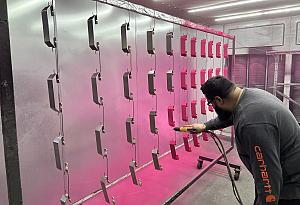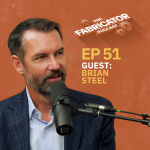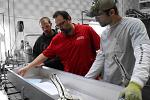- FMA
- The Fabricator
- FABTECH
- Canadian Metalworking
Categories
- Additive Manufacturing
- Aluminum Welding
- Arc Welding
- Assembly and Joining
- Automation and Robotics
- Bending and Forming
- Consumables
- Cutting and Weld Prep
- Electric Vehicles
- En Español
- Finishing
- Hydroforming
- Laser Cutting
- Laser Welding
- Machining
- Manufacturing Software
- Materials Handling
- Metals/Materials
- Oxyfuel Cutting
- Plasma Cutting
- Power Tools
- Punching and Other Holemaking
- Roll Forming
- Safety
- Sawing
- Shearing
- Shop Management
- Testing and Measuring
- Tube and Pipe Fabrication
- Tube and Pipe Production
- Waterjet Cutting
Industry Directory
Webcasts
Podcasts
FAB 40
Advertise
Subscribe
Account Login
Search
Who's to blame for the lack of skilled workers?
- By Vicki Bell
- March 10, 2011
Some, such as one reader whose response was included in the newsletter, believe educators and their unions are to blame. This reader, who works for a company that produces components for the HVAC industry, said, "As with most companies, we have to try to recruit teachable personnel who want to learn and train them in-house to do what we have already paid school systems to do!! Education is not improved by simply throwing more money at 100-percent unionized teachers, who know they cannot be laid off or held accountable. One definition of insanity is continuing to follow failed policies, which we seem to know how to do."
Just how much of the current skills shortage, which extends to deficiencies in basic math and language skills, is a result of our educational system is open for debate. While some of yesterday's respondents believe the cited comments about education's shortcomings are valid—"I like the comment about union teachers!"; "between unionized teachers at war with education bureaucrats, both of whom are at war with taxpayers, we have succeeded in destroying what was once a great, commonsense public education system"—others say this opinion is mistaken.
Among the latter group is John Henning, a senior engineer with a company that makes heat recovery and pollution control equipment. Henning took issue with blaming teachers and called the HVAC industry reader's comments a "right-wing, tea-bagger, uninformed, antiunion rant."
Henning said, "I would like to point out to the author of this rant that teachers can only do so much. As the engineer husband of a teacher, I would recommend that if you could find individuals to work for your company that are as hard working and dedicated as most teachers you would not have to worry about global competition. Of course there are some poor teachers, just like there are marginal welders, fitters, supervisors, and engineers.
"The real problem isn't teachers. It is parents whose children are woefully unprepared for school—kids that are hungry, tired, dirty, have neither appropriate clothing nor medical care—kids whose parents have no respect for teachers or education—kids whose parents never read to them, never talk to them (other than teach them multiple uses of the word f**k), or make sure their homework is done—kids who have seen every popular R-rated movie but have no idea what a book is.
"Never mind that teachers have to put up with kids suffering from FAS (fetal alcohol syndrome), or were crack or meth babies and continually disrupt the classroom, making it nearly impossible to have cogent linear instruction. I would suggest that [the individual who blames educators] commit to volunteer at an inner city school. Make that commitment for a suitable learning period—say 12 hours per week for 6 months or more—and then get back to us so we can hear what he has to say.
"As a final note, in the last 12 months, at my wife's school, two teachers have been fired and two more have 'voluntarily' taken medical leaves. So yes, teachers can be and are fired or encouraged to leave. I would also point out that the union worked with the school to remove the teachers, but that is another story."
(These are just some of Henning's remarks. He also wrote about the disappearance of apprenticeships, industry training programs, and technical and vocational schools. And he addressed the negative perception of manufacturing that keeps many from pursuing industrial jobs: "In case you didn’t notice, working in a factory is looked on as being one step lower than septic tank sucker truck operator by gen Xers and gen Yers. To be sure, you aren't seeing anything close to the cream of the crop fellas." These issues are topics for future blog posts.)
Henning made valid points about the challenges today's teachers face educating our children. Teaching is not a job for the fainthearted, and those of you who think teachers have it made—tenure, long vacations, etc.—aren’t considering these and other challenges.
My father was an educator, and I admire teachers greatly. I originally set out to be one. But I also have observed an unfit, tenured teacher moved from school to school, because the board didn't want to fight with the union for his dismissal. In this particular instance, the school principal asked for a transfer rather than be saddled with this teacher for another year. For this reason, I have a negative opinion of teacher unions—and school boards—but that's just me. I don't expect everyone to agree with me, but I'm entitled to my opinion, as are Henning, other "Fabricating Update" readers, and you. You are always welcome to express your opinion. Scroll down and fire away.
Follow fabcomlady on Twitter.
Become a fan of The Fabricator® on Facebook.
subscribe now

The Fabricator is North America's leading magazine for the metal forming and fabricating industry. The magazine delivers the news, technical articles, and case histories that enable fabricators to do their jobs more efficiently. The Fabricator has served the industry since 1970.
start your free subscriptionAbout the Author

Vicki Bell
2135 Point Blvd
Elgin, IL 60123
815-227-8209
- Stay connected from anywhere

Easily access valuable industry resources now with full access to the digital edition of The Fabricator.

Easily access valuable industry resources now with full access to the digital edition of The Welder.

Easily access valuable industry resources now with full access to the digital edition of The Tube and Pipe Journal.
- Podcasting
- Podcast:
- The Fabricator Podcast
- Published:
- 04/09/2024
- Running Time:
- 63:55
In this podcast episode, Brian Steel, CEO of Cadrex Manufacturing, discusses the challenges of acquiring, merging, and integrating...
- Industry Events
16th Annual Safety Conference
- April 30 - May 1, 2024
- Elgin,
Pipe and Tube Conference
- May 21 - 22, 2024
- Omaha, NE
World-Class Roll Forming Workshop
- June 5 - 6, 2024
- Louisville, KY
Advanced Laser Application Workshop
- June 25 - 27, 2024
- Novi, MI































